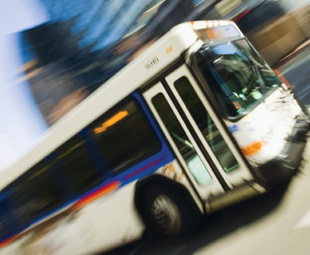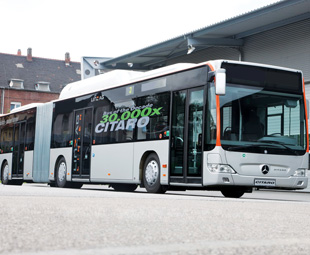’Tis the season to be jolly safe

As we approach another festive season, with the inevitable road fatalities that can be expected, CLAIRE RENCKEN takes a look at what the SA bus and coach sector can do to maximise the safety of its precious cargo, other road users and their fleets …
South African road users are again facing the December rush for holiday destinations and, sadly, face the possibility of becoming one of the many who will die as a result of poor driving habits, unroadworthy vehicles, substance abuse and pedestrian negligence.
Michael Crossland of Precision Safety Appliances believes transport companies can make a positive contribution by instituting sound policies. “I agreed with former Minister of Transport Sibusiso Ndebele when he said that ‘We will only win the battle against road deaths once all sectors of society take responsibility for safety on our roads’.” Crossland believes bus operators can make a huge contribution by being proactive and diligent about testing drivers for substance abuse.
Here’s a sobering statistic: of more than 15 million vehicles checked by law enforcement agencies in 2010/2011,
21 575 drunk drivers were arrested. This emerged in the million-a-month vehicle check campaign that forms part of the National Rolling Enforcement Plan (NREP) – and speaks volumes about our casual attitude towards drinking and driving.
Bus drivers working long hours over the festive season may contribute to this statistic, not only by abusing alcohol, but also through the abuse of drugs, whether legal or illegal.
The ways in which employers can help matters include:
• Educating drivers about the risks they themselves and their passengers face if they drive under the influence;
• Ensuring that drivers understand the vital role they play in road safety;
• Instituting a sound substance abuse policy, ensuring that drivers are aware of it and understand its consequences; and
• Implementing strict testing and monitoring procedures for drugs and alcohol.
Crossland continues: “It shouldn’t all be one-sided though. Management should not expect drivers to drive their buses for unreasonable lengths of time without a break. Bus drivers differ from long-haul truck drivers in that they have passengers on board, and an accident could lead to multiple injuries and deaths.”
So what constitutes a good substance abuse policy for bus drivers? That’s easy: zero tolerance. This must be spelt out – and not just verbally. It should be part of a clearly defined substance abuse policy that forms part of the company’s health and safety policy; and should detail the relevant testing procedures. Detecting substance abuse can be fraught with problems such as infringing on employees’ rights to privacy, so a well-written policy will ensure that the employer stays on the right side of the law.
A sound testing programme should incorporate breath alcohol testing at the beginning and end of a shift or journey. In terms of drugs, drivers should be tested on a regular basis. This could be annually when medicals are performed or at the company’s discretion such as every month, or every three months or six months.
The company’s management, health staff and safety officers should watch for the warning signs of substance abuse. Signs that indicate that testing may be warranted include:
• Unruly and/or aggressive or despondent behaviour;
• Marked increase in absenteeism and/or deterioration of health;
• A definite decrease in productivity for no apparent reason; and
• An unusually dishevelled appearance.
Deciding on the best testing method for the situation, and investing in high quality detection equipment, will enable a company to save time and money (by avoiding the need for retesting) and, most importantly, lives. It doesn’t make sense to have all the correct procedures in place, only to find that your instruments are unreliable or severely limited in what substances they can detect.
It should also be noted that abuse can be masked, and that steps to prevent intoxicated employees from returning to their buses and resume driving should
be taken.
Says Crossland: “We supply world-renowned Lifeloc portable breath alcohol testers and Noble Split-Specimen Cup drug testing systems to transport companies. They’re easy to use and we provide back-up on these instruments, training in their use and regular instrument calibration. The results of tests using our instruments are recognised in CCMA cases as they have proven to be very reliable.”
Alternative fuels – know the risks
As the quest continues for alternative, natural fuels which are less harmful to the environment, particularly abroad, it seems that some bus companies may be losing sight of the need for comprehensive research and testing of these fuels. Fredrik Rosén of the SP Technical Research Institute in Sweden explains: “By introducing new alternative fuels, you also introduce new risks and two recent incidents clearly show that more fire safety research in this area is needed.” The incidents to which he is referring occurred in the Netherlands and Korea.
 The former took place in the town of Wassenaar in the western Netherlands and involved a compressed natural gas (CNG) powered bus bursting into flames. Luckily, the driver and passengers were alerted by smoke and flames at the rear of the bus and were able to disembark from the bus before it was engulfed in flames. The fire spread rapidly, and attempts by the driver and passengers to extinguish it were to no avail. Being a CNG-powered bus, there were a number of large cylinders on the roof – these are all fitted with relief valves which discharge when the pressure becomes too high. This is exactly what happened: the gas ignited and razed the bus to the ground. Only once the gas cylinders were empty could the blaze be safely extinguished.
The former took place in the town of Wassenaar in the western Netherlands and involved a compressed natural gas (CNG) powered bus bursting into flames. Luckily, the driver and passengers were alerted by smoke and flames at the rear of the bus and were able to disembark from the bus before it was engulfed in flames. The fire spread rapidly, and attempts by the driver and passengers to extinguish it were to no avail. Being a CNG-powered bus, there were a number of large cylinders on the roof – these are all fitted with relief valves which discharge when the pressure becomes too high. This is exactly what happened: the gas ignited and razed the bus to the ground. Only once the gas cylinders were empty could the blaze be safely extinguished.
Those involved in the Korean incident weren’t as lucky – 17 people were injured in Seoul, the capital of South Korea, when a CNG-powered bus exploded. The CNG tank ruptured, tearing the bus apart and shattering nearby windows. The catastrophic failure resulted in injuries to passengers as well as nearby pedestrians. Seoul’s bus fleet comprises approximately 95 percent CNG buses. As a result, the government has launched an immediate investigation into the safety of the fuel tanks. If the failure is determined to be result of a defect in the tank, all buses manufactured in the same year will be recalled, and possibly others if their tanks are considered suspect.
It’s an undisputable fact that drivers and owners of public transport vehicles have to take responsibility for the safety of their passengers. To avoid costly lawsuits and more importantly, tragic and unnecessary loss of life, commitment, comprehensive research and the taking of precautions wherever possible are essential.
Published by
Focus on Transport
focusmagsa




